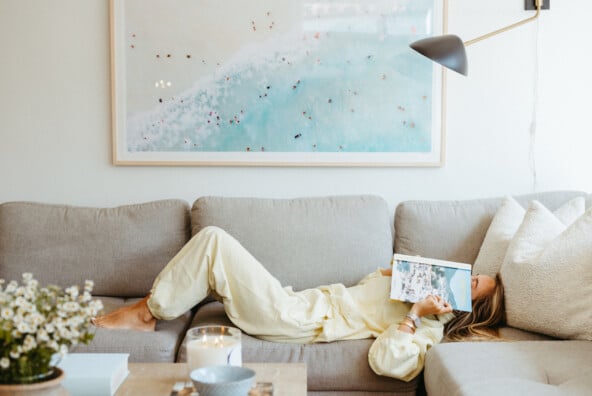We’ve probably all considered a digital detox at one point. But if you’re anything like me (or the rest of the CS team) the challenge is not if, it’s when. Aside from the rare vacation, it feels like there’s no good time to start a digital detox! So for this edition of the Wellness Report we set a date, and Camille committed to giving up all of her devices – her phone, iPad and laptop – for 48 hours.
Camille’s goals for the detox were to get more comfortable with the feeling of boredom, and to be more present in her interactions with friends and family. We all know that time spent staring down at a screen can be a distraction at the dinner table or with friends, but what surprised Camille post-detox was how her devices had been affecting her even during time spent off the phone, “I realized that I might send off a quick email when I get in the car, but once I start driving my mind is still wondering if they’ve seen it, fighting the urge to check it at a stoplight, and thinking of what to say next.” On the detox, Camille found that she was “listening and paying more attention to Phoebe when we’re in the car. That’s time we’ve been spending together where I’ve been distracted by my phone even when I’m not on it.”
I recently heard about a study by the University of Texas McCombs School of Business that I simply can’t stop thinking about. The study had participants take tests with their phone on their desk face down, in their bag, or in another room. The participants whose phones were in another room significantly outperformed the rest, “Your conscious mind isn’t thinking about your smartphone,” says the study’s co-author Professor Adrian Ward, “but that process — the process of requiring yourself to not think about something — uses up some of your limited cognitive resources. It’s a brain drain.” Even when participants had their phones turned off while taking the tests, Ward found “the mere presence of their smartphone was enough to reduce their cognitive capacity.” So if you’re not ready for a full on detox yet, you could consider at least putting your phone in your bag while you’re at work or in another room for a few hours at home to put a stop to the “brain drain” we experience simply by having them near us.
The hardest part of the detox? Once the impulse to constantly check her phone wore off, Camille’s biggest challenges were getting through her day-to-day tasks without the convenience of a device at her fingertips. From checking the weather to buying groceries to using a calculator, phones just make us more efficient at getting stuff done. Watch to see what happened when Camille attempted a 48-hour digital detox.
“I think everyone could benefit from a detox,” Camille said after her 48 hours were up, “I think my mom probably has a healthy relationship with her phone because she just uses it to text her kids, but all of my friends are on their phones constantly, so doing a detox regularly is probably a good idea.” She’d definitely like to try one again, but wants to find ways to take time away from her emails, text messages and social media, while still using its more practical functions.
Have you ever tried a digital detox? What were your biggest takeaways? Let us know in the comments.






